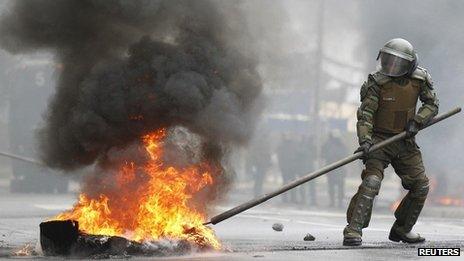Chile's judges apologise for their actions after coup
- Published

The 1973 military coup is still a divisive issue in Chile
The body representing judges in Chile has made an unprecedented apology for the actions of its members under military rule in the 1970s and 1980s.
In a statement, it said that the judiciary at the time had abandoned its role as protector of basic rights.
"The time has come to ask for the forgiveness of victims... and of Chilean society," said the judges.
More than 3,000 people were killed under the dictatorship of General Augusto Pinochet between 1973 and 1990.
The statement by the National Association of Magistrates of the Judiciary comes a week before the 40th anniversary of the coup that brought General Pinochet to power.
It said its members, and in particular the Supreme Court, had failed in its duty to protect victims of state abuse.
The magistrates' association acknowledged that the Chilean judiciary could and should have done much more to safeguard the rights of those persecuted by the dictatorship.
It said the judges had ignored the plight of victims who had demanded their intervention.
Chilean courts rejected about 5,000 cases seeking help on locating missing loved ones abducted or killed by the authorities.
Critics say their usual response was they had no information about their fate.
Chile's current centre-right government has said the country will officially recognise the anniversary of the coup.
President Sebastian Pinera said last month that the coup on 11 September 1973 was "a historical fact" and its 40th anniversary should be a time of "reflection."
The announcement came after the conservative senator and former president of the Independent Democratic Union, Hernan Larrain, apologised for his party's actions.
"I ask for forgiveness," he said. "This is my voice for reconciliation."
- Published24 February 2013
- Published6 February 2013
- Published12 September 2012